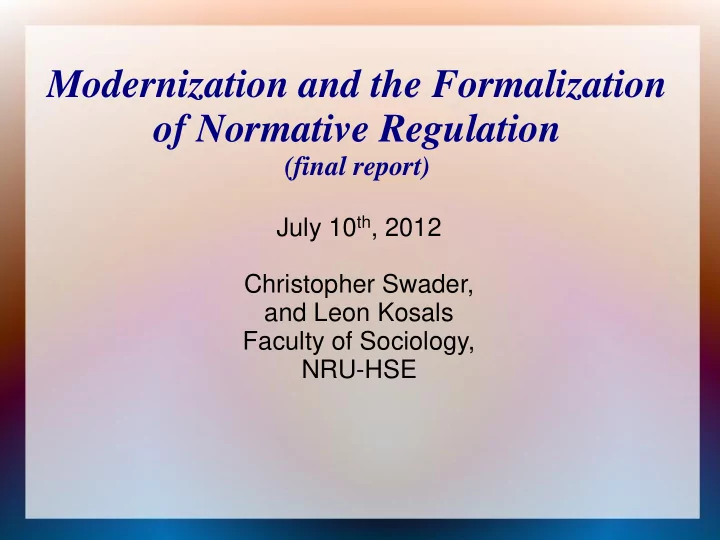

Modernization and the Formalization of Normative Regulation (final report) July 10 th , 2012 Christopher Swader, and Leon Kosals Faculty of Sociology, NRU-HSE
Research Question How does modernization connect with informality, and how do different types of informality relate to one another in relation to modernization?
Concepts: Formality and Informality Informality : “social situations or gatherings that are generally characterized by behavioral spontaneity, casualness, and interpersonal familiarity.” Formality: refers to such social settings that are more “regimented, deliberate, and impersonal in nature” (Morand, 1995: 831 -2) . loose versus tight, casual versus strict, personal versus impersonal, immediate versus abstract, spontaneous versus routinized, emotional versus rational Literature: ahistorical and unidimensional?
Concepts: Formality as Normative Regulation Formality can refer to..... 1)the medium of normative regulation (social control) 2)a high density of normative regulation (vs. anomie) 3)a high compliance to norms 4)an enhanced enforcement /reinforcement of norms and violations
Old and New Previous Presentations : Economic modernization and formal social control testing of don't know anomie (DKA) scale results on DKA scale and modernization results on DKA scale and informal social control This Presentation: refinement of gdp, corruption, shadow economy indicators Prediction of individual anomie scores: OLS regression
Formality as Medium of Normative Regulation
Economic Modernization and Formal Economic Control
Economic Modernization and Formal Political Control
Economic Modernization and Formal Interpersonal Control
Formality as Density of Normative Regulation
Measuring Anomie: DKA Scale In Politics The government should take more responsibility to ensure that everyone is provided for. How much confidence do you have in political parties? How much confidence do you have in the justice system? Good way to govern? Having a strong leader who does not have to bother with parliament or elections. Good way to govern? Having a democratic political system In Economics Wealth can grow so that there is enough for everyone. How much confidence do you have in major companies? Incomes should be made more equal. Private ownership of business and industry should be increased. Competition is good. It stimulates people to work hard and develop new ideas. In Interpersonal values Family important? Friends important? Most people can be trusted. Do most people try to take advantage of you? It is important to this person to help the people nearby
Linking anomie to low gdp per capita
but anomie also linked to high economic growth
Relationship between formality as medium and density (=between social control and anomie)
Anomie is linked to political informality
Anomie and political informality ...
How can individual anomie be predicted? Do social control, country-level anomie, or modern values have an influence?
Conclusions • Medium of political, economic, and interpersonal normative control » more formal with modernization • Economic stock » less anomie • Economic growth » more anomie • Political informality (corruption) » anomie • After controlling for education, individual anomie can be predicted best by country-level anomie, followed by female gender and low income
Informal Social Control (close personal relationships) Undermines Economic Individual Societal Normative informal change ANOMIE ANOMIE uncertainty social control Normative Political Economic stabilization formalization Formal Social stock Control (modern political power – laws, ideology, police)
To improve in article: • Enhance our N at the country level (right now, only about 42) • Multi-level analysis necessary. • What else?
Recommend
More recommend